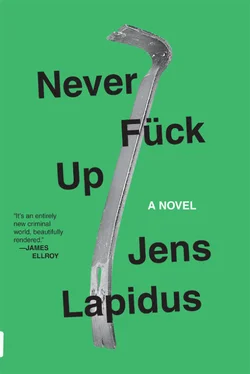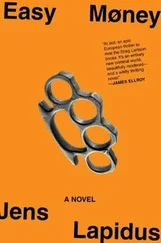The broker explained the routine. The preparations. The timing. The process. The guy looked like he thought this was all a game.
“First we’ll register you at a rental out in the boondocks for a few months—a place with a short tenant wait list attached to it. Everything’ll look good on paper. That’s where you’ll be registered and since there was a short wait list, no one will wonder how you got your hands on it. I’ll deal with the landlord. After a few months, we’ll exchange the apartment for the one you’re actually going to buy. That way, the trade will look completely clean. After that, the seller will have to be registered at the same apartment you traded from—that is, your fake apartment—for at least two months. Credibility is everything in my field, as I’m sure you understand.”
Problem. This wouldn’t cut it—Niklas had to get a place this week already. He had to get out of Mom’s apartment. Fast.
The broker grinned. “Okay, I think I know your problem. Did your chick kick you out, or what? Shredded clothes? Trashed stereo? Things tend to go a little High Chaparral when they’re mad.”
Niklas held his gaze. Stared for two seconds longer than normal social codes would allow if he were laughing it off as a joke.
The broker finally got the message—this was not the time to try to be funny. “Whatever,” he said. “I can still help you. We’ll get you a sublet for those three months when you’ll need to wait. Does that work? I can put you in a sweet one-bedroom, five hundred and forty square feet, in Aspudden. If you want it, you can have it next week. But it’ll cost a little extra, of course. What do you think?”
He needed something even sooner. “If I pay more, can you get it faster?”
“Faster than that? You’re really cutting it close, I have to say. But sure, you can get it the day after tomorrow.”
Niklas smiled inside. That sounded good. He had to get away.
Better than expected, actually.
To disappear so quickly.
3

The Southern District might not have the most incident reports per capita, but it always had the most major crime. The City District, downtown, definitely topped the numbers, everyone knew that, but that’s because the scum from south of Södermalm came into the city and did a lot of petty shit there. Shoplifted, pocketed cell phones, harassed, started bar brawls.
Thomas thought, The south—real ghettos that the politicians don’t give a damn about. Fittja, Alby, Tumba, Norsborg, Skärholmen. Everyone knew the names of the northern shit holes: Rinkeby and Tensta. Diversity aid and cultural organizations abounded. Support efforts were focused. Project money rained down. Integration institutes invaded. But in the south, the gangs ruled for real. Iraqis, Kurds, Chileans, Albanians. The Bandidos, Fucked for Life, Born to Be Hated. You could spend ages burping up calamities. Topped the Swedish lists in number of firearms, number of guys who refused to talk to cops, number of reported blackmail attempts. The criminals organized, copied the MC clubs’ hierarchies, pulled together their own steel-fisted gangs. The teen punks followed the examples set by older bank robbers/drug dealers/thugs. A well-trodden road. To a shit life. The list was endless—all the facts were there. In Thomas’s eyes, didn’t matter what you labeled those niggers and losers—they were all scum, the lot of them.
He’d heard all the theories that the social-service ladies and the youth psychologists droned on about. But what were they really supposed to do with all those behavioral, cognitive, dynamic, psychiatric, blah-blah-istic hypotheses? No methods worked anyway. No one could clean it up. They spread. Reproduced. Multiplied. Took over. Once upon a time he too might have thought there was a way to stop it. But that was a long time ago now.
Things used to be better. A cliché. But as Lloyd Cole sings, the reason it’s a cliché is that it’s true.
Yet another night on the beat. Thomas was driving calmly. Let his hands rest on the wheel. Knew he’d get his ear chewed off at home for signing up for the night shift all week. He didn’t really need the extra money—even though that’s what he told Åsa. A police inspector’s base salary wasn’t even worth a tenth of the drugs he confiscated on a regular night. It was an insult. Ridicule. A loogie in the eye of all the honest men who really knew what needed to be done. So if they took back a little, it was only right.
There were five or six of them who took turns driving these routes together. Circled the areas around Skärholmen, Sätra, Bredäng. Damned the development to hell. Skipped the PC bullshit and the Commie fake-empathy crap. They all knew the deal—break the swine or roll over and die.
Thomas’s partner tonight, Jörgen Ljunggren, was sitting in the passenger seat. They usually switched sometime around 2:00 a.m.
Thomas tried to count. How many times’d he and Ljunggren slid through the slowly darkening summer nights like this? Without unnecessary chitchat. Ljunggren with his paper cup of coffee, always for too long—until the coffee got cold and he hurried off to get a refill at the closest all-night place. Thomas often with his thoughts elsewhere. Mostly focused on his car at home: zinc treatment for the new original detailing, parts to the differential in the back axle, the new tachometer. A project of his own to long for. Or else he yearned for the shooting range. He’d just bought a new pistol—a Strayer Voigt Infinity, made to his specifications. Thomas was lucky in that way, he had more than one home. First the cruiser with the guys. Then his own car at home. Then the shooting club. And then, maybe, home-home—his house in Tallkrogen.
Jörgen Ljunggren suited Thomas well—he preferred people who didn’t babble too much. What came out was mostly nonsense anyway. So they were quiet. Shared meaningful looks sometimes, nodded, or exchanged short remarks. That was enough for them. They liked it that way. Mutual understanding. A worldview. It wasn’t complicated: they were here to clean up the crap flooding the Stockholm streets.
Ljunggren was one of the best on the squad. A good guy to have on your side when things heated up.
Thomas felt relaxed.
The police radio was spewing out commands. The Stockholm County Police Department used two frequencies instead of one: the 80 system for City, the Southern District, and the Western District, and the 70 system for the rest. In accordance with the rest of the organization. The fact that there were two systems instead of one: inefficiency was the middle name of this operation. No one ever woke up to realize a new age’d dawned. You couldn’t keep trudging along in the same old tracks anymore. His thoughts ran on a loop: The rabble organized completely differently these days. It wasn’t just some Yugos and washed-up Finns running amok. The bottom-feeders stayed fresh. Professional, international, multidisciplinary criminals. New methods were needed to get at them. Faster. Smarter. Tougher. And as soon as someone wanted to do something about it, the media started whining about the new laws as if they were intended to hurt people.
The radio crackled. Someone needed assistance with a shoplifter at a twenty-four-hour bodega in Sätra.
They exchanged glances. Grinned. Forget it, they weren’t taking a crap job like that—let some greenhorn cadet take it. They ignored the call. Drove on.
Approached Skärholmen.
Thomas downshifted, slowed. “We’re thinking of going away for Christmas again.”
Читать дальше














